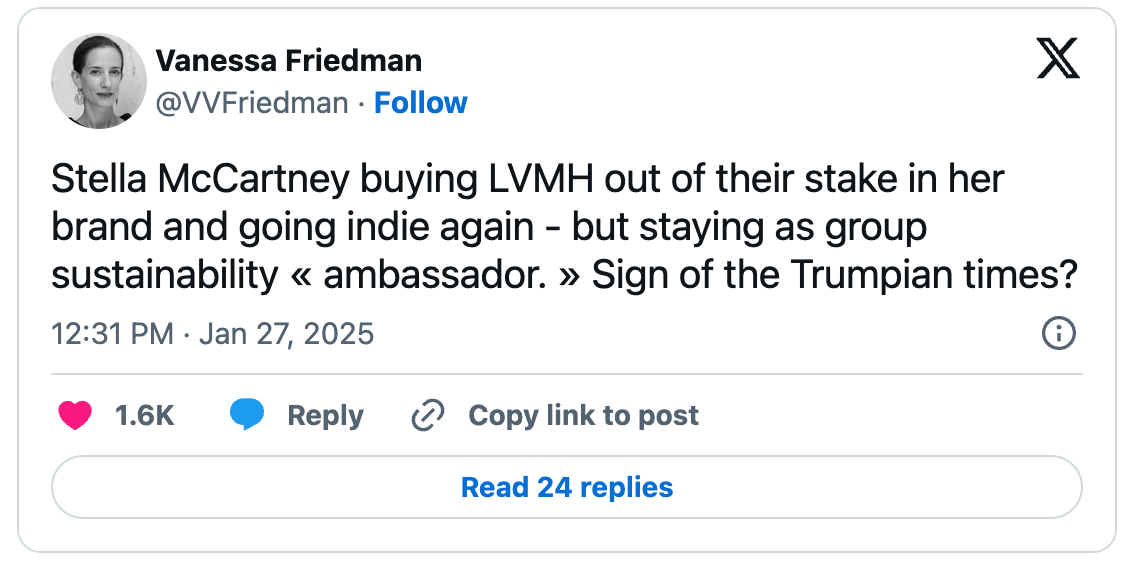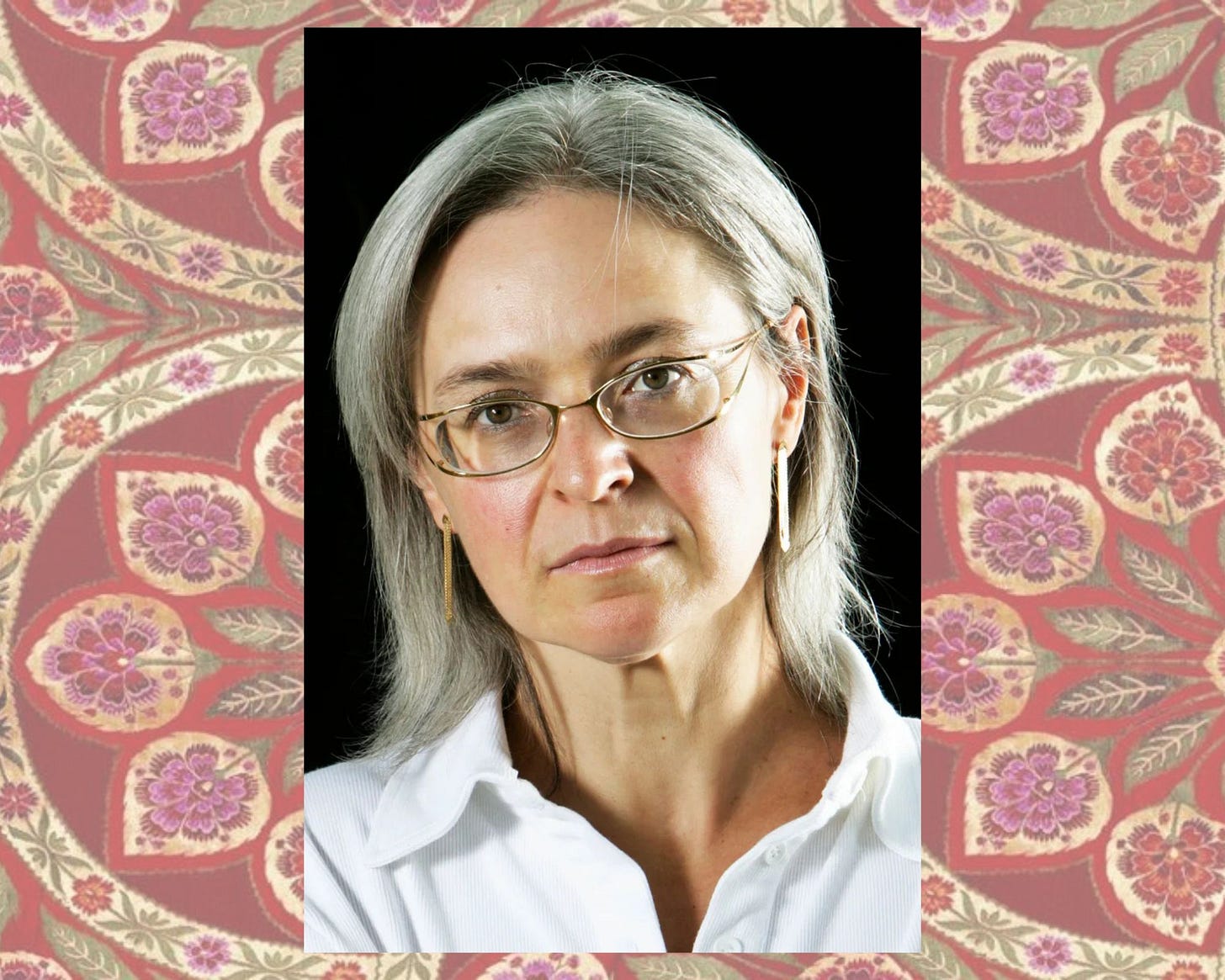Japan’s government really only wants men on the throne.
And what happens when a TikTok star and €30 bus trips collide.
“The Intersection” is your Monday, Wednesday and Friday briefing on global affairs, social innovation, culture, and design—offering fresh insights through the lenses of sustainable development, women-centered perspectives, and emerging global trends. The aim? To keep you informed, curious, and always ready with a compelling conversation starter at the dinner table.
Chinese influence operation urged Spaniards to 'overthrow the government,' intelligence firm claims.
Israel releases Palestinian prisoners after delay over chaotic hostage handover.
Civil rights activists call for a Target boycott after retailer backs away from diversity programs. I am right there with them.
Hospital nurse dies in Uganda in first Ebola virus outbreak since 2022, health ministry says.

New Zealand has extended personhood to Taranaki Maunga, formerly known as Mount Taranaki, recognizing the mountain as an ancestor of the Indigenous Māori people. The ruling affirms its status as a “living and indivisible whole,” safeguarding its cultural heritage, traditional uses, and ongoing conservation efforts. This decision builds on New Zealand’s progressive precedent of granting personhood to natural landmarks such as the Whanganui River and Te Urewera forest. Thankfully, these newly recognized entities are spared the bureaucratic burden of filing taxes.
Japan’s government really only wants men on the throne. Following a report by the United Nations’ CEDAW urging Japan to revise the Imperial House Law to allow female emperors, the country has responded by halting its funding for the committee. Japan’s stance is that imperial succession qualifications fall outside the scope of basic rights and that the male-only rule does not constitute discrimination against women. The 1947 Imperial House Law, rooted in preserving conservative pre-war family values, restricts succession to male heirs and requires female royals who marry commoners to forfeit their royal status. However, with a rapidly shrinking imperial family of just 16 members—only four of whom are men—concerns are mounting over the stability of the succession system. The youngest male royal, Prince Hisahito, is currently the sole heir apparent. Despite this, the conservative government continues to explore alternatives to secure the male line, including a proposal to reintegrate male descendants of former noble families who lost their royal status after World War II, rather than opening the throne to women (Fun fact: Naruhito is the current emperor of Japan and is the only remaining monarch and head of state in the world who holds the title of Emperor.)
Monica Lewinsky is launching a new podcast, Reclaiming with Monica Lewinsky, an interview-based series that explores the art of taking back what’s been lost or stolen. With an eye on healing and personal growth, Lewinsky promises a show where listeners can find “nuggets” of hope, humor, or connection. As she told Vanity Fair, it’s all about creating moments that shift energy, whether that means a laugh when you need it or a spark of optimism. Each episode will wrap up with Lewinsky asking her guest to reveal what they’re working to reclaim—whether it’s a memory, a feeling, or a long-lost object. Debuting in February, the early guest list includes Molly Ringwald, Kara Swisher, and Alan Cumming. Consider it a reclaiming of the airwaves.
Stella McCartney has regained complete control of her namesake label after buying back the minority stake held by LVMH. While stepping away from the French luxury group, McCartney will continue her role as LVMH's Global Ambassador on Sustainability, a position she’s used to champion recycling and upcycling initiatives across its brands. Known for her unwavering commitment to cruelty-free, sustainable design—eschewing leather, fur, and animal-based glues—McCartney has built her brand on ethical principles. New York Times fashion director Vanessa Friedman speculated on X that McCartney’s decision might be linked to LVMH’s associations with the Trump family. I’m going to guess she is probably right.
When a TikTok star and €30 bus trips collide, even the serene slopes of Roccaraso can’t escape the chaos. The mayor of Roccaraso, a ski resort in Italy’s Abruzzo mountains, is taking action after the town was overwhelmed by 260 buses carrying over 10,000 day-trippers from Naples and Campania, lured by a TikTok star and budget travel deals. The influx, sparked by influencer Rita De Crescenzo and €20-€30 bus packages with breakfast included, clogged roads, overcrowded slopes, and left the resort strewn with rubbish. Francesco Di Donato, Roccaraso’s mayor, has now capped weekend tourist buses at 100, requiring pre-booking, and defended the move against claims of discrimination towards Neapolitans. “We want civilised skiers,” he told Corriere della Sera, highlighting that a €30 trip doesn’t even cover the €60 cost of a ski pass. De Crescenzo, who has 1.7 million TikTok followers, denied responsibility for the chaos and pledged to return with an even larger crowd (!!!), calling Roccaraso’s newfound fame a point of pride. The incident has reignited debates about overtourism, typically reserved for cities like Venice and Florence, while underlining the growing influence of social media in driving crowds to less-prepared destinations.

Six Nordic paintings to help you rethink winter. An "acceptance of the seasonality of life".
Alibaba has entered the AI battleground with Qwen2.5 Max, its latest large language model, which the e-commerce titan claims outshines rivals like DeepSeek-V3 and Meta’s Llama-3.1-405B in benchmark tests. Available through Qwen Chat, Alibaba’s release intensifies competition sparked by Chinese startup DeepSeek, whose R1 model and AI assistant app recently made waves, topping U.S. iPhone download charts. But success has its costs—DeepSeek reports “large-scale malicious attacks” on its systems and has temporarily restricted new registrations. The White House is keeping a close eye on these developments, citing potential national security risks, while OpenAI accuses Chinese firms of attempting to reverse-engineer U.S. models. With AI’s global heavyweights vying for dominance, the stakes are high, and the plot feels eerily like the opening chapter of a dystopian novel—just without the rogue robots (for now).
These Kashmiri creatives want to show you new ways of looking at traditional Kashmiri art.
Ulta Beauty is set to make its debut in the Middle East through a franchise partnership with Alshaya Group, a leading international retail operator. The first stores are expected to open by late 2025, following Ulta's upcoming entry into Mexico, its first international market. "This partnership with Alshaya marks an exciting step in expanding Ulta Beauty's unique business model to new regions as part of our growth strategy," said Kristin Wolf, Ulta’s senior vice president of enterprise strategy and new growth. "The power of beauty is universal, and we look forward to connecting with a new community of beauty enthusiasts in the Middle East." (As of now, Ulta remains pro-DEI.) While Sephora, already well-established in both Mexico and the Middle East, is known for its luxury offerings, Ulta’s appeal lies in its mix of drugstore staples and midlevel brands—a formula that has made it a favorite among American shoppers. Whether that blend resonates globally remains to be seen, but Ulta is betting big on its inclusive approach to beauty. (Side note: Rhode is going to be debuting at Sephora later this year.)
And the circus rolls on... Thursday’s Senate confirmation hearings put several of Trump’s more contentious nominees under the microscope, delivering a mix of sharp scrutiny and eyebrow-raising moments.
Former U.S. Representative Tulsi Gabbard faced three hours of pointed questioning during her hearing for director of national intelligence. Senators on both sides probed her stances on Russia and Syria, as well as her past defense of Edward Snowden, the whistleblower who exposed classified NSA surveillance programs —a stance that drew bipartisan skepticism.
Kash Patel, nominated to lead the FBI, also underwent rigorous examination. Patel pledged to protect FBI agents involved in cases against Trump, despite prior statements minimizing the January 6th Capitol attack. His promises followed a controversial shake-up earlier in the week when acting Attorney General James McHenry dismissed over a dozen Justice Department officials tied to these investigations.
Meanwhile, Robert F. Kennedy Jr., Trump’s pick for secretary of health and human services, appeared before the Senate health committee. Kennedy sparked fresh controversy by doubling down on debunked conspiracy theories, including unfounded claims about the COVID-19 vaccine’s safety, and defending previous inflammatory comments about the immune systems of minority groups. His cousin, Caroline Kennedy, didn’t mince words ahead of the hearing: “It’s no surprise he keeps birds of prey as pets—he’s a predator himself.” Disturbing? Yes. Unpredictable? Not in the slightest.
And, the Senate has confirmed Doug Burgum as interior secretary after Trump tasked him to boost drilling. Gross.
Anna Politkovskaya (1958-2006): Born in New York City to Ukrainian Soviet diplomats, Politkovskaya emerged as one of Russia's most fearless investigative journalists. She gained international acclaim for her uncompromising reporting on the Second Chechen War, chronicling the conflict’s devastating impact on civilians and exposing abuses by Russian forces and the Chechen regime. Her work, often published in Novaya Gazeta, was marked by a rare blend of bravery and humanity. Politkovskaya risked her life repeatedly, enduring arrests, a mock execution, and even poisoning during an attempt to mediate the 2004 Beslan school hostage crisis. Despite these threats, she remained steadfast in her commitment to uncovering the harsh realities of the war and advocating for its victims.
Politkovskaya’s career was deeply intertwined with her criticism of Vladimir Putin and his government. Her book Putin's Russia painted a chilling portrait of a country slipping into authoritarianism, accusing the Federal Security Service (FSB) of stifling civil liberties and fostering a climate of fear. Her reporting extended beyond Chechnya, highlighting human rights abuses across the North Caucasus and within Russia itself. Whether documenting the mass poisoning of schoolchildren in Chechnya or securing the evacuation of elderly residents from a besieged Grozny, her journalism was an act of defiance against oppression and indifference.
Tragically, Politkovskaya’s dedication to truth made her a target. On October 7, 2006—Putin’s birthday—she was assassinated in her Moscow apartment building, a murder that shocked the world. Though five men were later convicted of her killing, the question of who orchestrated the assassination remains unanswered. Politkovskaya’s legacy endures as a symbol of journalistic courage and the power of speaking truth to power in the face of overwhelming adversity.
Happy learning! Hope you have a great weekend.
Jennifer
xxx









Lol'd at the mountain paying taxes line. Really enjoying the newsletter! Thanks for putting this together!